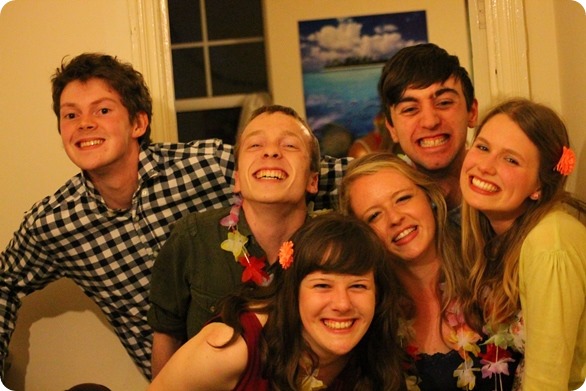Around one third of the UK population – approximately 19 million people – will develop an allergy at some time in their lives. A significant proportion of these – around a million people – suffer severe symptoms.
Teenagers and young adults are statistically the most at risk from severe reactions. This may be due to their increased independence leading to risk taking behaviours like drinking, not reading food labels, not carrying emergency medications and eating out without letting the chef know about their allergy. Some want to eat the same foods as their peers and may “try” a food to “see what happens”

How many 15-25 year olds with severe allergies don’t always carry their medication with them? How concerning is this statistic?
Last year in 2012, the Anaphylaxis Campaign commissioned a survey of over 500 young people aged 15 – 25. It found that over one third of those asked did not always carry their life saving adrenaline – the only effective emergency treatment for anaphylaxis.
This is very concerning as severe allergic reactions can develop very quickly, and if adrenaline is not administered promptly, the reaction can be very serious and possibly life- threatening.
A survey Anaphylaxis Campaign commissioned last year found that 72% of people with severe allergies aged between 15 and 25 were not currently receiving any kind of expert medical care or advice. Why do you think this percentage is so high?
We are not sure, but could be due to young people beginning to live more independently from their parents and carers, who when they were younger took responsibility for their medical care.
As peer relationships become important and becoming more independent and possibility a little rebellious too, then finding the correct care may become less of a priority. They may have been seen by a paediatric specialist but not transferred to an adult clinic.
The Anaphylaxis Campaign: Supporting people with severe allergies
What can be done to improve the amount of expert medical advice young people with severe allergies receive?
They should seek referral to an adult allergy clinic once they are of an appropriate age. Allergy provision is generally poor, but organisations such as the Anaphylaxis Campaign and the National Allergy Strategy Group (NASG), together with some allergy specialists are campaigning for improvements.
The Anaphylaxis Campaign also offers online training courses called ‘AllergyWise’ for healthcare professionals, GPs and for pharmacists.
What impact can having a severe allergy have on the choices young people make, such as the decision over whether to go to university?
People with severe allergies can live practically normal lives – as long as they learn to manage their condition. Many of our members have gone to university, travelled abroad and had a great time. Our key objective is to educate and give people the tools and knowledge to live happy, safe independent lives.
Anaphylaxis Campaign - Off to University? Don't let your allergy hold you back!
How does Anaphylaxis Campaign aim to help young people manage their severe allergies?
 We are the only UK wide charity to exclusively meet the needs of the growing numbers of people at risk from severe allergic reasons (anaphylaxis) by providing information and support relating to foods and other triggers such as latex, drugs and insect stings.
We are the only UK wide charity to exclusively meet the needs of the growing numbers of people at risk from severe allergic reasons (anaphylaxis) by providing information and support relating to foods and other triggers such as latex, drugs and insect stings.
Our work for young people includes special sections on our website and in our magazine ‘Outlook’. We also run workshops all over the country for young people, giving them guidance and tools to manage their allergy themselves.
We have also recently produced a video for our YouTube channel about going to University.
We are in the process of developing more projects and initiatives to reach out to this group.
We encourage everyone with a severe allergy to join us as a member. Our members receive our magazine ‘Outlook’ sent to them twice a year, regular e-newsletters, product alerts sent by text and also benefit from the support our organisation can provide.
How do high profile cases of deaths from anaphylaxis in young people affect the public’s perception of severe allergies?
Fortunately deaths from anaphylaxis are very rare. We are not sure how this influences public perception, but cases like this do demonstrate the severity of the condition.
Anaphylaxis Campaign Professor John Warner OBE
What excites you most about Anaphylaxis Campaign’s current work and what are your plans for the future?
We are working on lots of great projects to help young people and also everyone who lives with severe allergies every day – including families and carers of children who have a severe allergy.
Our 20 year anniversary is next year, 2014, and we are planning lots of events and special initiatives to celebrate the Anaphylaxis Campaign and our work since the charity was created in 1994.
Where can readers find more information?
Our website has lots of information – www.anaphylaxis.org.uk. We tweet regularly @anaphylaxiscoms and we have a Facebook page (just search for Anaphylaxis Campaign).
We also have a YouTube channel which contains lots of short films covering what to do in an emergency, the clinical overview of anaphylaxis and severe allergy and lots of case studies - https://www.youtube.com/user/AnaphylaxisCampaign
About Lynne Regent
 I joined the Anaphylaxis Campaign as Chief Executive Officer (CEO) in October 2008. Prior to taking up this role I spent nearly 30 years working in the NHS in the UK, ultimately as the Chief Executive of Crawley PCT in the South East. As CEO of Anaphylaxis Campaign I ensure that the charity achieves its objective of helping people with severe allergies live their lives. Alongside this, I am co-vice-chairman of the National Allergy Strategy Group (NASG), which is the alliance of the professional organisation for Immunologists and Allergists, the patient Allergy Charities and industry partners. The NASG works to highlight the need for allergy services, the inadequate care available for allergy patients at all levels in the NHS and to improve NHS allergy services. I am also on the Patient Organising Committee for EACCI, the European-wide Immunologist and Allergist professional body.
I joined the Anaphylaxis Campaign as Chief Executive Officer (CEO) in October 2008. Prior to taking up this role I spent nearly 30 years working in the NHS in the UK, ultimately as the Chief Executive of Crawley PCT in the South East. As CEO of Anaphylaxis Campaign I ensure that the charity achieves its objective of helping people with severe allergies live their lives. Alongside this, I am co-vice-chairman of the National Allergy Strategy Group (NASG), which is the alliance of the professional organisation for Immunologists and Allergists, the patient Allergy Charities and industry partners. The NASG works to highlight the need for allergy services, the inadequate care available for allergy patients at all levels in the NHS and to improve NHS allergy services. I am also on the Patient Organising Committee for EACCI, the European-wide Immunologist and Allergist professional body.
During 2013-2017 I am spearheading the UK patient group involvement in iFAAM which is the largest ever European-wide study of the severely allergic population to be undertaken, and is examining an integrated approach to food allergens and allergy risk management.